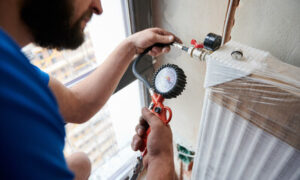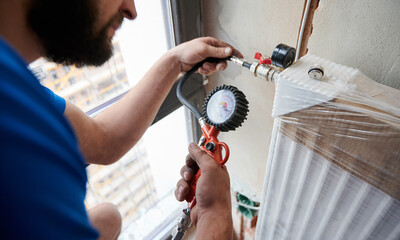Natural gas is an affordable and reliable energy source, but it is flammable and can cause fires or explosions. Many of these accidents are caused by Gas Leaks NYC in the piping that brings the gas into homes and buildings.

The first thing you should do if you suspect a gas leak is to evacuate the building as quickly as possible. Be sure to take your pets with you. Do not use telephones or light switches, which can create sparks that may ignite the leaked gas.
If gas escapes containment for too long, it can cause serious physical symptoms. A sudden onset of headaches, dizziness, and nausea are all signs that gas might be nearby. A foul odour that smells like rotten eggs or sulphur is also indicative of the presence of natural gas in the air. In some cases, the escaping gas can even lead to a fire or explosion if it comes into contact with an ignition source, such as a lighter flame or pilot light.
Luckily, there are many ways to test for the presence of a gas leak in your home or business. One simple way is to mix a small amount of dish soap with water and wipe down the suspected area. If bubbles form, there is a high chance that you have a gas leak. Another test involves putting a stick into a gas meter to see if it produces a hissing sound when you poke at it. A hissing sound indicates that there is a leak in the line.
In addition to these tests, it is important for building occupants to know the symptoms that can indicate a gas leak. Headaches, nausea, fatigue, eye irritation, and a burning sensation on the skin are all symptoms that should be taken seriously. If you suspect that there is a gas leak, open the windows and evacuate the building immediately.
If possible, turn off any appliances that use natural gas and shut off the main gas valve if you have one. Do not use any lighters or matches, and do not start any vehicles or operate electrical devices. If you do, you might create a spark that could ignite the leaking gas and cause an explosion or fire. You should also call the gas company to report the leak and ask them for advice on what steps to take next. In the event of a severe leak, it might be best to simply leave the building and wait for a professional to arrive. They can locate the source and fix it safely. Using preventative maintenance, performing regular assessments, and hiring licensed plumbers can all help reduce the risk of accidental gas leaks in your home or business.
Finding the source
There are a few ways to spot a gas leak in the home or workplace. First of all, the most obvious sign is the smell. If a houseplant suddenly dies (despite your green thumb) or you see a strange cloud or bubble in still water, these are all signs of possible gas leakage. Another easy clue is a sudden increase in your gas bill with no explanation as to why. Because gas leaks can cut off oxygen, people who are exposed to them may experience certain physical symptoms, such as shortness of breath and dizziness.
In the home, you might notice a whistling sound or a hissing odour near a leaking natural gas line. Often, these odours are caused by a gas appliance not burning properly or a problem with the piping connecting the appliance to the main line. A hissing sound can also be a sign of a high-pressure leak, which needs to be dealt with immediately to avoid serious injury or property damage.
Fortunately, it’s easy to find the source of the leak if you know what to look for. First of all, make sure the room is well ventilated before trying to sniff out a smell. If there is a smell, try to pinpoint where it’s coming from by listening carefully. A hissing noise could be a leaking hose, or it might be a pipe that is corroded or punctured.
Most of the time, gas leaks happen because of poorly fitted or maintained appliances, such as boilers and cookers. Other times, the leaking gas comes from a buried pipe that has not been protected by a weatherproof covering and is rusting away. We sometimes even see leaks from corrugated stainless steel lines that were positioned too close to the roof and then punctured by string trimmers.
If you think there is a gas leak, evacuate the area with your family and pets. Don’t use any electrical devices or turn on any lights, as a spark can ignite the leaking gas and cause an explosion. Call your local utility company or a licensed professional right away to deal with the leak and test the area.
Evacuating the building
Evacuating a building is an important part of the evacuation process, and it’s essential that every person knows the right steps to take during an emergency. Whether you work in a school, office, or other business, having a well-established evacuation plan is vital to ensuring everyone’s safety during emergencies like gas leaks.
If you notice any of the signs of a gas leak, it’s imperative that you act immediately. If you can’t evacuate the area, you may need to shelter in place instead. A qualified technician can assess the situation and determine the best course of action for your location.
Natural gas is colourless and odourless, which is why it’s important to recognize the signs of a leak. If you smell rotten eggs or sulphur, hear a hissing noise, see misty clouds or bubbles in standing water, or have dead vegetation nearby, there is a high likelihood of a gas leak.
Once you’ve evacuated the building, make sure you don’t return until your local fire department or gas company says it’s safe to do so. Using any electronic devices, such as cell phones or computers, near a gas leak can cause them to spark and ignite. You should also stay away from any open flames, such as candles or lighters, and don’t turn on electrical switches or appliances.
It’s best to walk outside of the building rather than take the elevator, especially if you can see a fire department dot line or a “do not cross” line on the ground. This helps you put some distance between yourself and the building in case the gas leaks again or an explosion occurs.
If you’re planning any landscaping or excavation near your home, call 811 to have the utility company mark where gas lines are located so you won’t accidentally rupture them during digging. A leaking natural gas line can lead to an explosion and cause damage to buildings, homes, or cars in the surrounding area. In addition, a small leak can quickly become a big problem and require extensive repairs to repair the line.
Calling for help
Natural gas is a safe and reliable source of heat, but when a leak occurs, it’s important to know what to do. Knowing the signs of a gas leak can help homeowners respond quickly, minimizing the impact of the problem and ensuring the safety of their family members and pets.
If you notice the scent of sulphur or rotten eggs, hear a hissing noise, or see bubbles in puddles near your gas lines, you have a serious gas leak and need to act immediately. Even if the odour isn’t strong, you should still leave the area and warn others.
You should also call your utility company to report the leak. They can shut off your gas and ensure that the leak is contained. You should not attempt to repair the leak yourself or use any electrical appliances until you’ve been notified by a professional that it is safe to return home.
When you call for assistance, you should give your name, address, and location of the odour, as well as a description of any other related information. You should also give the dispatcher your phone number so that they can contact you if there are any questions. You should not light a match, smoke, flip a switch, or use any other device that could produce sparks, as doing so can ignite the gas and cause an explosion.
Gas leaks are dangerous and need to be addressed as soon as they occur. Educating yourself on proper emergency procedures and the prevention of workplace gas leaks can help keep you and your colleagues safe from the hazards of these emergencies. Be sure to familiarize yourself with these tips and practice regularly with your team so everyone knows what to do in the event of a gas leak.
